multivitamin support
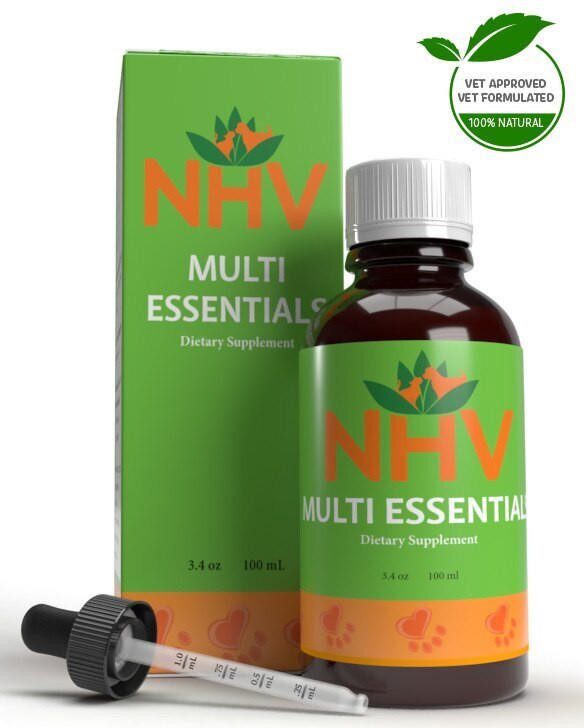
free shipping over $100 (USA & Canada)
1-877-937-4372 the pet expert hotline
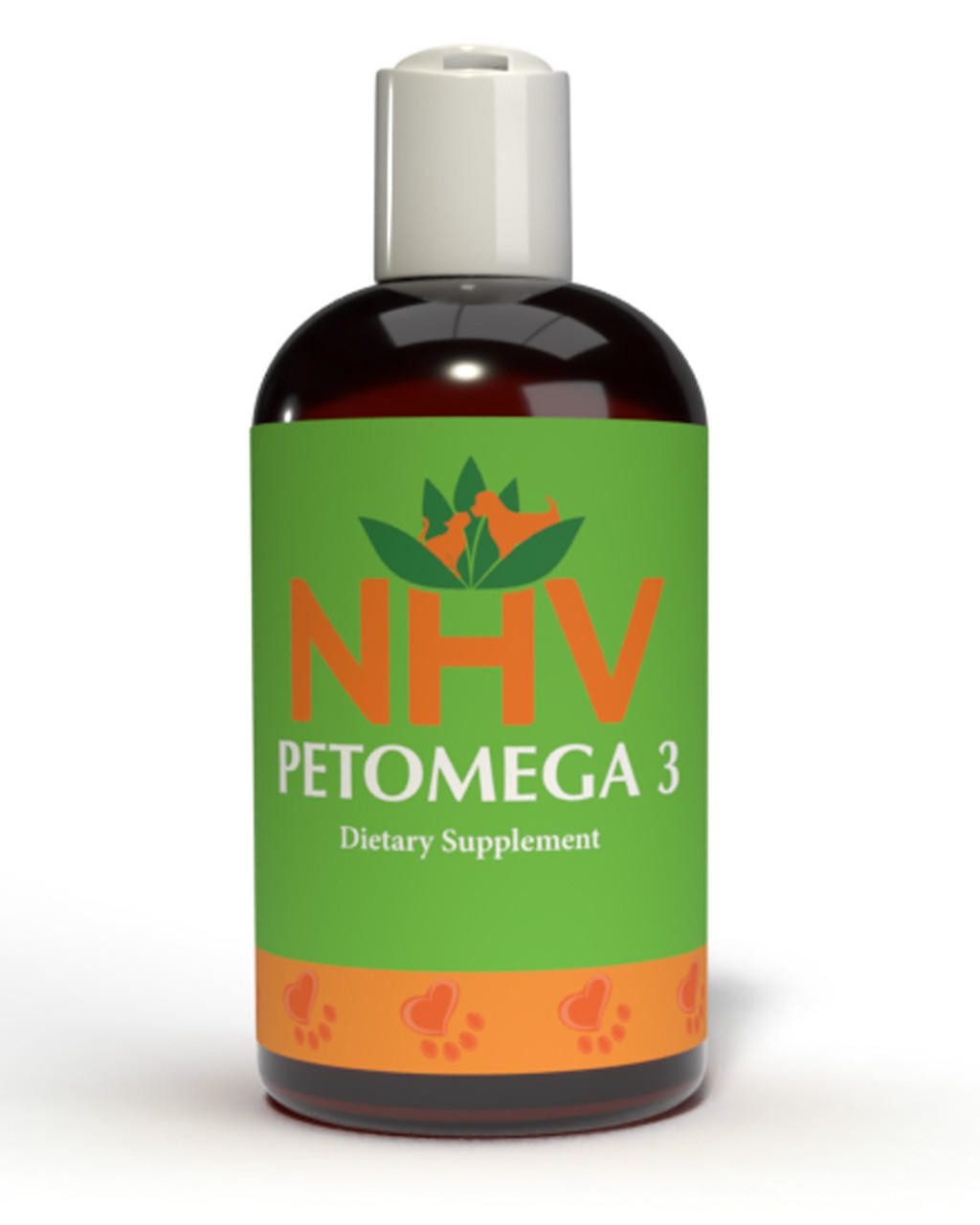
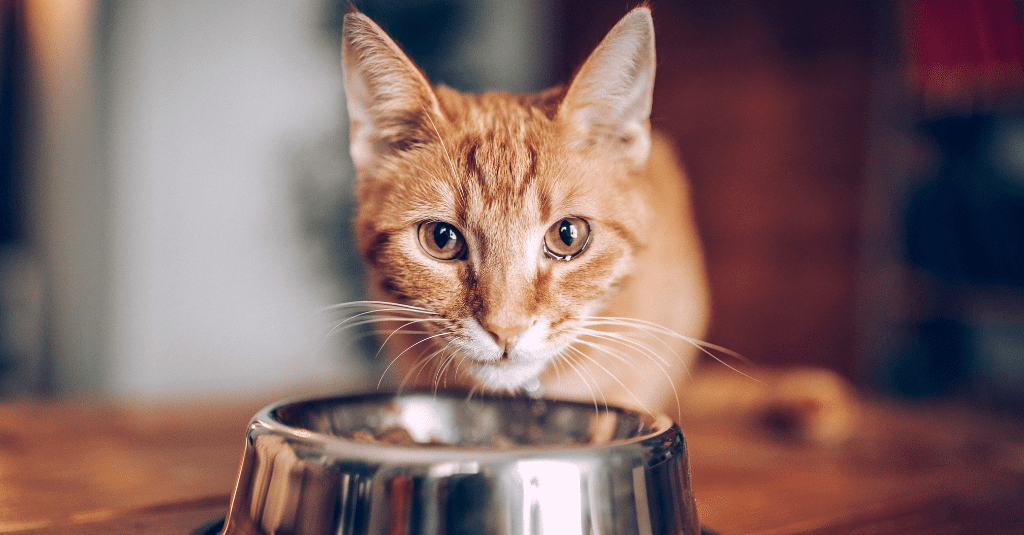
If you have a kitty or are considering adding a cat to your family, you might be wondering if there’s any truth behind their bad rep for being picky eaters. Can cats eat dog food? is only one of the many questions about feline dietary needs that our pet experts have to answer ever so often.
Each furkiddo has a unique body and might have different food preferences, but there are a few truths about a cat’s anatomy and ancestry that can help you understand what they should eat.
If you are a parent of both cats and dogs, there is a chance that your curious little ones snoop around each other’s food. Trying each other’s vet-approved meals occasionally is not a problem, as neither should have toxic ingredients for pets. However, cats and dogs have different nutritional needs. So even though your cat can eat your dog food, they shouldn’t, especially not long-term.
Cats are carnivores, which means they need a meat-based diet. Dogs, on the other hand, are omnivores, that is, they have a more flexible diet, which should include both animal and vegetable ingredients. This means that if a cat eats dog food for a long period, it would be deprived of several nutrients that its furry body would need to function properly.
Kitties that don’t eat enough protein will have nutritional deficiencies that can lead to serious conditions in the long run.
Kitties that don’t eat enough vitamins, minerals, and principally protein will have nutritional deficiencies that can lead to serious conditions in the long run. Especially because of the lack of taurine, an essential amino acid that they need to get from the meat in their diet.
A taurine deficiency can take several months to show any symptoms, and by then it might be too late. Low levels of taurine in a cat’s body can lead to eye issues, digestive problems, and a weakened heart and can cause delayed growth in young kittens.
Cats can be considered pickier eaters, and their restricted palate is part of the reason. Taste buds are responsible for capturing the taste of food and sending the information to the brain. Kitties only have 473 taste buds and cannot sense sweet tastes. In comparison, dogs have 1,600 taste buds and can detect the same five tastes as humans – sweet, sour, salty, bitter, and umami.
NHV herbal formulas are glycerine-based and have a natural sweet taste to them. So if your picky kitty is struggling to eat their food mixed with our supplements, chances are they don’t like the smell. That is why we recommend masking the herbal scent with something cats love, like fish!
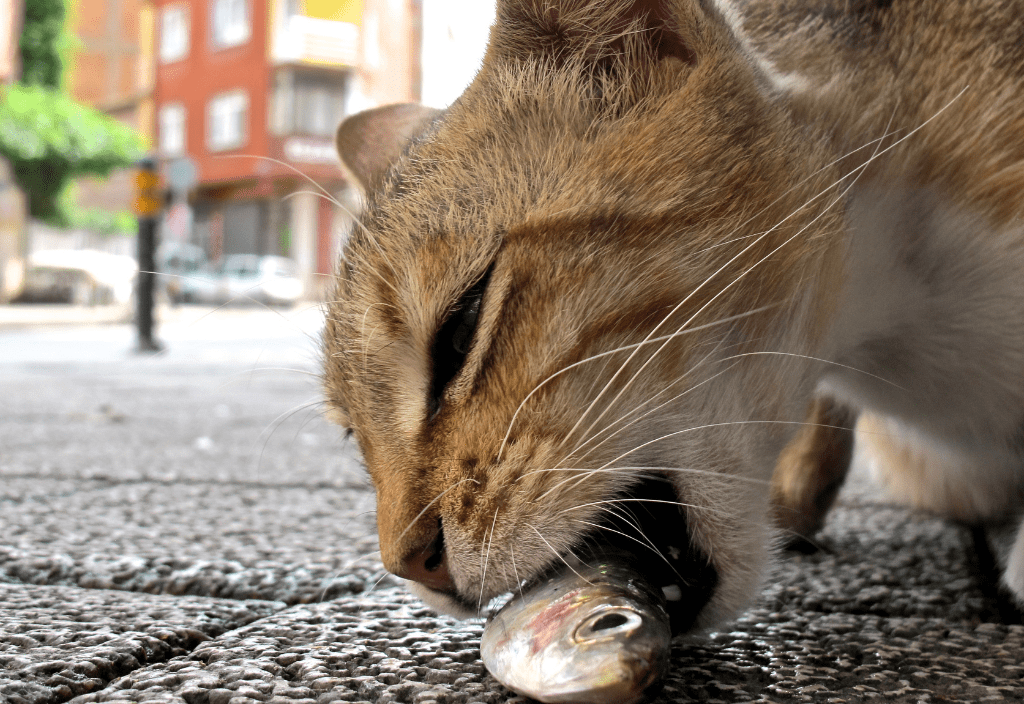
A cat’s heightened sense of smell makes up for their poor palate. That is why they love strong-scented foods like fish! It is well known that cats love fish, and this is not only because they love playing with their food, or because of the smell, but also because their body needs its nutritional content.
Fishes are very nutritious and are a great source of protein and omega-3. The fatty acids in fish help support cardiac health, skin and coat conditions, joints, and kidneys, prevent weight loss, and overall cancer support. Including our fish oil blend, NHV PetOmega 3 as a daily supplement to your little one’s diet can enhance the food’s taste and smell while helping with overall health and well-being.
Maintaining your cat in a species-specific diet is crucial. If you’re still not sure your little one is ingesting every vitamin and mineral they need to grow strong, you can add NHV Multi Essentials. This herbal multivitamin works alongside a balanced diet to help fill any nutritional voids, enhance nutrient absorption, and aid digestion.
Oral health is also very important to help our pets have proper food ingestion and improved nutrition. That’s where NHV Mouth Drops comes in. This herbal mouthwash aids in eliminating bad breath, gingivitis, and bacterial infections of the mouth. Mouth Drops can also help guard against tooth decay and plaque.
Being proactive and conscious about your little one’s nutritional health is one great sign of love and attention. In case you notice any signs of changes in your cat’s eating behavior, please talk to your local veterinarian. We are also always here to offer support and recommend holistic options. Click here for a personalized nutritional plan with your little one needs in mind. Click bellow to talk directly to one of our pet experts!
multivitamin support

Herbal Digestive Aid, Energy Booster, and Multivitamin for Cats
buy 2 and save $3
3 month supply for a small to medium size pet
These multivitamins for cats will ensure your kitty (of any age) is getting an extra dose of minerals and vitamins for extra energy, vitality, and health.

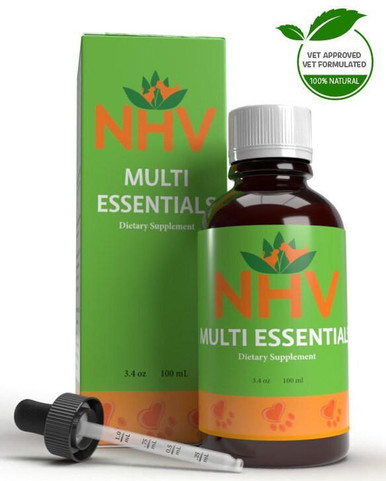
These multivitamins for cats will ensure your kitty (of any age) is getting an extra dose of minerals and vitamins for extra energy, vitality, and health.

The health benefits of multivitamins aren’t just for humans. Cats have many of the same nutrient needs as we do, and some need even more than others depending on their age and health.
A multivitamin supplies the vital nutrients your kitty needs to be healthy and to fight off potential health problems. Dr. Cook, DVM, CVA in her blog states that vitamins “help to regulate the body processes, protect the body from environmental toxins, and break down nutrients such as carbohydrates, proteins, and fats so the body can utilize them”.
The best way to give your cat vitamins and minerals are from whole food sources and not just isolated synthetic vitamins. NHV Multi Essentials contains a powerful blend of alfalfa, oat, dandelion, kelp, parsley, marshmallow, chickweed, stinging nettle, Asian ginseng, yucca and Oregon grape.
Health Benefits of NHV’s Multi-Essentials for Cats
With NHV’s multi vitamins for cats, you get a proprietary blend of all-natural ingredients that are organically grown and contain no artificial additives, preservatives, or coloring. Some of the health benefits include:
Multivitamins for cats will ensure your kitty is getting the proper nutrients that could be lacking due to daily stressors, a poor diet, and environmental toxins.
Signs of Vitamin Deficiency in Your Cat
Kitties Who’ve Benefited from NHV Multi Essentials
NHV multi vitamin for cats has helped thousands of pets around the world. Here are just a few of their stories:
DEALING WITH DIGESTIVE ISSUES: MICI THE CAT LOVES HIS VITAMINS NHV MULTI ESSENTIALS
HERBAL MULTIVITAMINS AND TURMERIC HELP CATS, OATMEAL AND MELISSA LIVE HAPPIER
CAN CATS WITH FELV LIVE A HEALTHY AND NORMAL LIFE?
If you have questions regarding holistic support including vitamin supplements for cats, ask an NHV expert because, at NHV, we want your cat to feel clawtastic naturally!
Select your pet's weight to determine the correct dose.
To be taken twice daily. Determine your pet’s weight and then use the easy chart below to determine the correct dose. This is the minimum dosage.
Pet's Weight Dosage
0 - 15 lb = 0.5 ml
16 - 30 lb = 1.0 ml
31 - 45 lb = 1.5 ml
46 - 60 lb = 2.0 ml
61 - 75 lb = 2.5 ml
Over 75 lb = 3.0 ml
How to Administer
Shake well before use. The easiest method is to use the dropper provide and places the drops into your pet’s food or favorite treat. You can also use the dropper and squirt directly into the pet’s mouth.
Some pets can be finicky, if this occurs consider hiding the drops in foods most pet’s love such as fish, chicken or yogurt or a favorite treat. If your pet only eats dry food then soak a few kibbles at feeding time.
For Best Results
Herbal dietary supplements are beneficial to the health and wellbeing of your pet and are safe for long-term use. Every pet responds to natural herbal supplements differently, therefore it is important to be consistent and administer the product daily. Supplements generally take two to four weeks to take effect, however this will vary from one animal to the next.
Product Storage
All NHV Natural Pet Products are pure herbal extracts and contain no artificial additives, preservatives or coloring. Shelf life after opening is 6 months and must be refrigerated after opening.
Cautions and Contraindications
Do not use Multi Essentials in pregnant or nursing animals. Speak to your vet before using our products. A second visit is recommended if your pet’s condition does not improve, or deteriorates after continued use of the supplements.
All information provided by NHV Natural Pet Products is for educational purposes only.
The health benefits of multivitamins aren’t just for humans. Cats have many of the same nutrient needs as we do, and some need even more than others depending on their age and health.
A multivitamin supplies the vital nutrients your kitty needs to be healthy and to fight off potential health problems. Dr. Cook, DVM, CVA in her blog states that vitamins “help to regulate the body processes, protect the body from environmental toxins, and break down nutrients such as carbohydrates, proteins, and fats so the body can utilize them”.
The best way to give your cat vitamins and minerals are from whole food sources and not just isolated synthetic vitamins. NHV Multi Essentials contains a powerful blend of alfalfa, oat, dandelion, kelp, parsley, marshmallow, chickweed, stinging nettle, Asian ginseng, yucca and Oregon grape.
Health Benefits of NHV’s Multi-Essentials for Cats
With NHV’s multi vitamins for cats, you get a proprietary blend of all-natural ingredients that are organically grown and contain no artificial additives, preservatives, or coloring. Some of the health benefits include:
Multivitamins for cats will ensure your kitty is getting the proper nutrients that could be lacking due to daily stressors, a poor diet, and environmental toxins.
Signs of Vitamin Deficiency in Your Cat
Kitties Who’ve Benefited from NHV Multi Essentials
NHV multi vitamin for cats has helped thousands of pets around the world. Here are just a few of their stories:
DEALING WITH DIGESTIVE ISSUES: MICI THE CAT LOVES HIS VITAMINS NHV MULTI ESSENTIALS
HERBAL MULTIVITAMINS AND TURMERIC HELP CATS, OATMEAL AND MELISSA LIVE HAPPIER
CAN CATS WITH FELV LIVE A HEALTHY AND NORMAL LIFE?
If you have questions regarding holistic support including vitamin supplements for cats, ask an NHV expert because, at NHV, we want your cat to feel clawtastic naturally!
Select your pet's weight to determine the correct dose.
To be taken twice daily. Determine your pet’s weight and then use the easy chart below to determine the correct dose. This is the minimum dosage.
Pet's Weight Dosage
0 - 15 lb = 0.5 ml
16 - 30 lb = 1.0 ml
31 - 45 lb = 1.5 ml
46 - 60 lb = 2.0 ml
61 - 75 lb = 2.5 ml
Over 75 lb = 3.0 ml
How to Administer
Shake well before use. The easiest method is to use the dropper provide and places the drops into your pet’s food or favorite treat. You can also use the dropper and squirt directly into the pet’s mouth.
Some pets can be finicky, if this occurs consider hiding the drops in foods most pet’s love such as fish, chicken or yogurt or a favorite treat. If your pet only eats dry food then soak a few kibbles at feeding time.
For Best Results
Herbal dietary supplements are beneficial to the health and wellbeing of your pet and are safe for long-term use. Every pet responds to natural herbal supplements differently, therefore it is important to be consistent and administer the product daily. Supplements generally take two to four weeks to take effect, however this will vary from one animal to the next.
Product Storage
All NHV Natural Pet Products are pure herbal extracts and contain no artificial additives, preservatives or coloring. Shelf life after opening is 6 months and must be refrigerated after opening.
Cautions and Contraindications
Do not use Multi Essentials in pregnant or nursing animals. Speak to your vet before using our products. A second visit is recommended if your pet’s condition does not improve, or deteriorates after continued use of the supplements.
All information provided by NHV Natural Pet Products is for educational purposes only.
digestive support
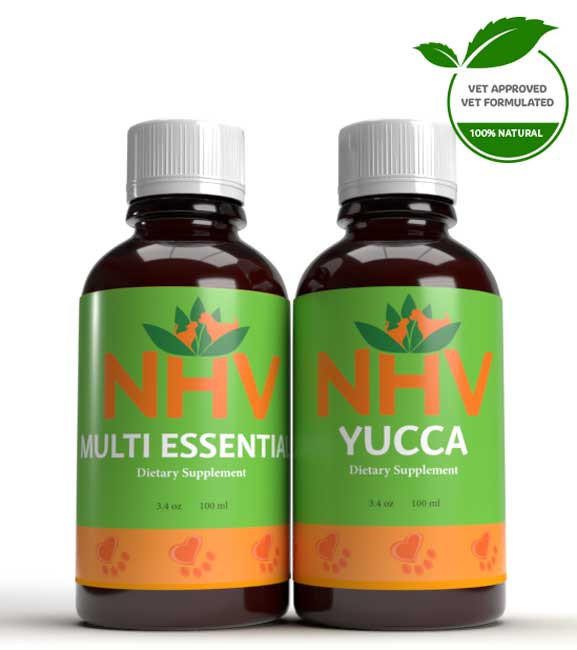
Yucca & Multi Essentials
bundle and save with pet expert kits
3 month supply for a small to medium size pet.
Just like humans, as our furkiddos age, their body may not be as good at breaking down food and absorbing vital nutrients. NHV’s Digestion Kit is a comprehensive bundle that helps to soothe inflammation, encourage better absorption, and stimulate metabolism.

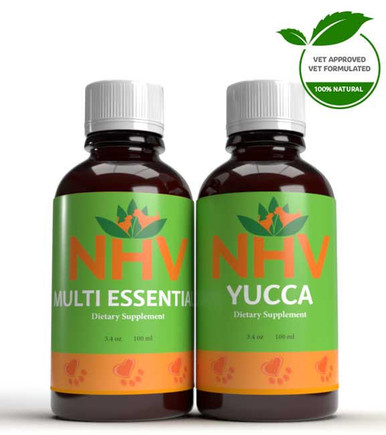
Just like humans, as our furkiddos age, their body may not be as good at breaking down food and absorbing vital nutrients. NHV’s Digestion Kit is a comprehensive bundle that helps to soothe inflammation, encourage better absorption, and stimulate metabolism.

Regardless of your furkiddo’s age, it’s never easy to see them slowing down and having difficulties with their health. If your furry friend is having a tough time with their digestion, then they may not be able to break down and absorb all of the nutrients necessary for maintaining healthy skin, fur and overall health. Our Digestion Kit is formulated to help fill nutritional voids, improve absorption and overall gastrointestinal health.
Just like humans, as our pets age, they may be a little less energetic. That's totally normal! We all require different levels of support at different stages in our lives. Our Digestion Kit contains Yucca, and Multi Essentials, which is a supplement bundle designed to help our pets better absorb nutrients and trigger metabolism. Yucca contains a high level of antioxidant properties that are beneficial for promoting healthy appetite and improving absorption. When it comes to cat sensitive stomach and gastrointestinal dog care, the herbs in Multi Essentials provide many key vitamins and minerals for building and maintaining healthy GI tract health, promoting healthy metabolism, and helping to reduce fatigue. Ingredients like chickweed and dandelion are effective digestive tonics that may help to enhance absorption while herbs like Oregon grape help to reduce indigestion and malabsorption.
It’s great to know that there are ways to support your furkiddo’s digestion naturally! Other than adding natural supports to their daily meals, if you’re wondering about options for gastrointestinal dog care and cat care, a personalized diet for your pet, created by Dr. Amanda, is another great way to support your furry friend!
Made with the finest, organically grown, or ethically harvested herbs. Made specifically for pets, vet-formulated, and vet approved.
Multi Essentials
Select your pet's weight to determine the correct dose.
To be taken twice daily. Determine your pet’s weight and then use the easy chart below to determine the correct dose. This is the minimum dosage.
Pet's Weight Dosage
0 - 15 lb = 0.5 ml
16 - 30 lb = 1.0 ml
31 - 45 lb = 1.5 ml
46 - 60 lb = 2.0 ml
61 - 75 lb = 2.5 ml
Over 75 lb = 3.0 ml
How to Administer
Shake well before use. The easiest method is to use the dropper provided and place the drops into your pet’s food or favorite treat. You can also use the dropper and squirt directly into the pet’s mouth. Some pets can be finicky, if this occurs consider hiding the drops in foods most pet’s love such as fish, chicken or yogurt or a favorite treat. If your pet only eats dry food then soak a few kibbles at feeding time.
For Best Results
Herbal dietary supplements are beneficial to the health and well-being of your pet and are safe for long-term use. Every pet responds to natural herbal supplements differently, therefore it is important to be consistent and administer the product daily. Supplements generally take two to four weeks to take effect, however this will vary from one animal to the next.
Product Storage
All NHV Natural Pet Products are pure herbal extracts and contain no artificial additives, preservatives or coloring. Shelf life after opening is 6 months and must be refrigerated after opening.
All information provided by NHV Natural Pet Products is for educational purposes only.
Regardless of your furkiddo’s age, it’s never easy to see them slowing down and having difficulties with their health. If your furry friend is having a tough time with their digestion, then they may not be able to break down and absorb all of the nutrients necessary for maintaining healthy skin, fur and overall health. Our Digestion Kit is formulated to help fill nutritional voids, improve absorption and overall gastrointestinal health.
Just like humans, as our pets age, they may be a little less energetic. That's totally normal! We all require different levels of support at different stages in our lives. Our Digestion Kit contains Yucca, and Multi Essentials, which is a supplement bundle designed to help our pets better absorb nutrients and trigger metabolism. Yucca contains a high level of antioxidant properties that are beneficial for promoting healthy appetite and improving absorption. When it comes to cat sensitive stomach and gastrointestinal dog care, the herbs in Multi Essentials provide many key vitamins and minerals for building and maintaining healthy GI tract health, promoting healthy metabolism, and helping to reduce fatigue. Ingredients like chickweed and dandelion are effective digestive tonics that may help to enhance absorption while herbs like Oregon grape help to reduce indigestion and malabsorption.
It’s great to know that there are ways to support your furkiddo’s digestion naturally! Other than adding natural supports to their daily meals, if you’re wondering about options for gastrointestinal dog care and cat care, a personalized diet for your pet, created by Dr. Amanda, is another great way to support your furry friend!
Made with the finest, organically grown, or ethically harvested herbs. Made specifically for pets, vet-formulated, and vet approved.
Multi Essentials
Select your pet's weight to determine the correct dose.
To be taken twice daily. Determine your pet’s weight and then use the easy chart below to determine the correct dose. This is the minimum dosage.
Pet's Weight Dosage
0 - 15 lb = 0.5 ml
16 - 30 lb = 1.0 ml
31 - 45 lb = 1.5 ml
46 - 60 lb = 2.0 ml
61 - 75 lb = 2.5 ml
Over 75 lb = 3.0 ml
How to Administer
Shake well before use. The easiest method is to use the dropper provided and place the drops into your pet’s food or favorite treat. You can also use the dropper and squirt directly into the pet’s mouth. Some pets can be finicky, if this occurs consider hiding the drops in foods most pet’s love such as fish, chicken or yogurt or a favorite treat. If your pet only eats dry food then soak a few kibbles at feeding time.
For Best Results
Herbal dietary supplements are beneficial to the health and well-being of your pet and are safe for long-term use. Every pet responds to natural herbal supplements differently, therefore it is important to be consistent and administer the product daily. Supplements generally take two to four weeks to take effect, however this will vary from one animal to the next.
Product Storage
All NHV Natural Pet Products are pure herbal extracts and contain no artificial additives, preservatives or coloring. Shelf life after opening is 6 months and must be refrigerated after opening.
All information provided by NHV Natural Pet Products is for educational purposes only.
Oral Care
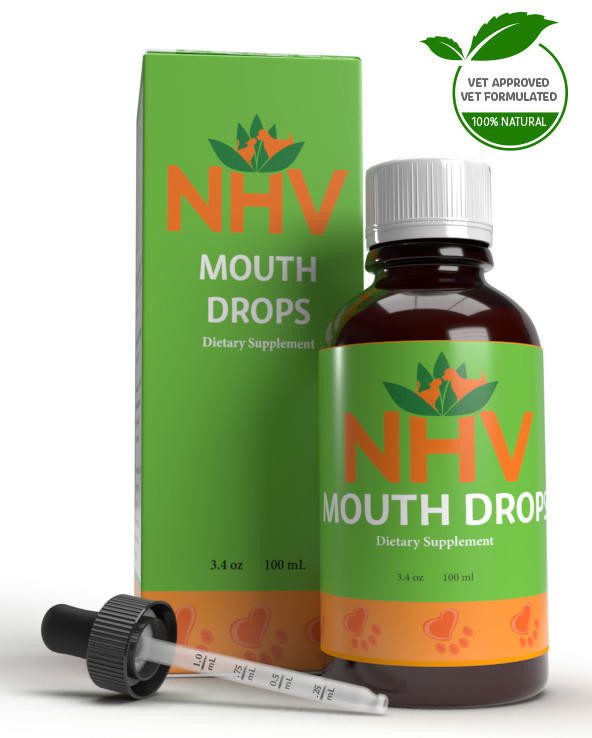
A natural herbal oral supplement that aids in eliminating bad breath, gingivitis, and helps combat bacterial infections of the mouth and helps guard against tooth decay and plaque.
buy 2 and save $3
3 month supply for a small to medium size pet.
1 bottle = 3 oz (100 ml)

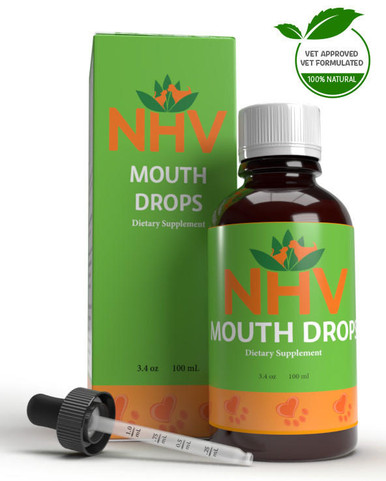
1 bottle = 3 oz (100 ml)

Does your pet have morning breath that lasts all day long? Mouth Drops from NHV Natural Pet Products are like a mouthwash for pets that helps eliminate bad breath, helps gingivitis, combats bacterial infections, and fight your pet's tooth decay and other dental problems. Use in combination with a nutritious diet and regular brushing to maintain the health of your pet’s teeth.
Mouth Drops may be beneficial for these conditions:
Additional Support:
Never attempt to diagnose a pet. A vet will be able to perform the required test and make the necessary suggestion.
White Oak – White oak is a type of hardwood tree native to eastern and central North America. It is traditionally used as an antiseptic, astringent, and anti-inflammatory herb. It has antiviral, antilithic, and astringent properties that control pain, inflammation, and help control bleeding.
Plantain – Plantain is an astringent, antibacterial, demulcent, emollient and anti-inflammatory herb. It has expectorant properties that soothe and lubricate internal mucous membranes, and helps stop bleeding.
Sage – Sage is often recommended as an antiseptic, and is commonly used for infections or sores of the mouth as well as topically for pets with gingivitis. It has anti-fungal, antiviral, astringent, diaphoretic and carminative properties. It also contains essential oils with antibacterial properties that neutralize mouth odor.
Echinacea Angustifolia – Commonly used for infections, Echinacea Angustifolia contains many active chemicals such as polysaccharides, flavonoids, caffeic acid, essential oils, alkylamides and polyacetylenes that have strong immune-stimulating (antiviral and antibacterial) properties.
Myrrh – It strengthens and activates the immune system and helps fight infections. It helps soothe inflamed gums, canker sores, loose teeth, and eliminates bad breath.
Neem – Neem has antibacterial, anti-fungal, anti-inflammatory, analgesic, and alterative properties, and is also high in antioxidants. Studies have found that it helps reduce plaque build up, defends against microorganisms, helps with gum bleeding, and reduces bacteria and bad breath.
Select your pet's weight to determine the correct dose.
Topically: To be taken twice daily. 1 drop for every 2 lb of body weight twice a day up to 50 lb. This is the minimum dosage.
Using the dropper squirt the dosage along teeth and gums.
Orally: To be taken twice daily. Determine your pet’s weight and then use the easy chart below to determine the correct dose. This is the minimum dosage.
Pet's Weight Dosage
0 - 15 lb = 0.5 ml
16 - 30 lb = 1.0 ml
31 - 45 lb = 1.5 ml
46 - 60 lb = 2.0 ml
61 - 75 lb = 2.5 ml
Over 75 lb = 3.0 ml
Some pets may require a larger dosage due to their metabolism. You can safely double the recommended dosage.
How to Administer
Shake well before use. Use the dropper provided to squirt the dosage directly into your pet’s mouth along the gums and teeth.. Some pets may be finicky and resist your attempts to administer drops directly into their mouth. If this occurs, try placing the drops in your pet’s food or favourite treat. You may want to consider hiding the drops in foods most pet’s love such as fish, chicken, or yogurt. When serving dry food, use the dropper to soak a few kibbles at feeding time.
For Best Results
Herbal dietary supplements are beneficial to the health and wellbeing of your pet and are safe for long-term use. Every pet responds to natural herbal supplements differently, therefore it is important to be consistent and administer the product daily. Supplements generally take two to four weeks to take effect, however this will vary from one animal to the next.
Product Storage
All NHV Natural Pet Products are pure herbal extracts and contain no artificial additives, preservatives or coloring. Shelf life after opening is 6 months and must be refrigerated after opening.
Cautions and Contraindications
Do not use Mouth Drops in pregnant or nursing animals. Speak to your vet before using our products. A second visit is recommended if your pet’s condition does not improve, or deteriorates after continued use of the supplements.
All information provided by NHV Natural Pet Products is for educational purposes only.
Does your pet have morning breath that lasts all day long? Mouth Drops from NHV Natural Pet Products are like a mouthwash for pets that helps eliminate bad breath, helps gingivitis, combats bacterial infections, and fight your pet's tooth decay and other dental problems. Use in combination with a nutritious diet and regular brushing to maintain the health of your pet’s teeth.
Mouth Drops may be beneficial for these conditions:
Additional Support:
Never attempt to diagnose a pet. A vet will be able to perform the required test and make the necessary suggestion.
White Oak – White oak is a type of hardwood tree native to eastern and central North America. It is traditionally used as an antiseptic, astringent, and anti-inflammatory herb. It has antiviral, antilithic, and astringent properties that control pain, inflammation, and help control bleeding.
Plantain – Plantain is an astringent, antibacterial, demulcent, emollient and anti-inflammatory herb. It has expectorant properties that soothe and lubricate internal mucous membranes, and helps stop bleeding.
Sage – Sage is often recommended as an antiseptic, and is commonly used for infections or sores of the mouth as well as topically for pets with gingivitis. It has anti-fungal, antiviral, astringent, diaphoretic and carminative properties. It also contains essential oils with antibacterial properties that neutralize mouth odor.
Echinacea Angustifolia – Commonly used for infections, Echinacea Angustifolia contains many active chemicals such as polysaccharides, flavonoids, caffeic acid, essential oils, alkylamides and polyacetylenes that have strong immune-stimulating (antiviral and antibacterial) properties.
Myrrh – It strengthens and activates the immune system and helps fight infections. It helps soothe inflamed gums, canker sores, loose teeth, and eliminates bad breath.
Neem – Neem has antibacterial, anti-fungal, anti-inflammatory, analgesic, and alterative properties, and is also high in antioxidants. Studies have found that it helps reduce plaque build up, defends against microorganisms, helps with gum bleeding, and reduces bacteria and bad breath.
Select your pet's weight to determine the correct dose.
Topically: To be taken twice daily. 1 drop for every 2 lb of body weight twice a day up to 50 lb. This is the minimum dosage.
Using the dropper squirt the dosage along teeth and gums.
Orally: To be taken twice daily. Determine your pet’s weight and then use the easy chart below to determine the correct dose. This is the minimum dosage.
Pet's Weight Dosage
0 - 15 lb = 0.5 ml
16 - 30 lb = 1.0 ml
31 - 45 lb = 1.5 ml
46 - 60 lb = 2.0 ml
61 - 75 lb = 2.5 ml
Over 75 lb = 3.0 ml
Some pets may require a larger dosage due to their metabolism. You can safely double the recommended dosage.
How to Administer
Shake well before use. Use the dropper provided to squirt the dosage directly into your pet’s mouth along the gums and teeth.. Some pets may be finicky and resist your attempts to administer drops directly into their mouth. If this occurs, try placing the drops in your pet’s food or favourite treat. You may want to consider hiding the drops in foods most pet’s love such as fish, chicken, or yogurt. When serving dry food, use the dropper to soak a few kibbles at feeding time.
For Best Results
Herbal dietary supplements are beneficial to the health and wellbeing of your pet and are safe for long-term use. Every pet responds to natural herbal supplements differently, therefore it is important to be consistent and administer the product daily. Supplements generally take two to four weeks to take effect, however this will vary from one animal to the next.
Product Storage
All NHV Natural Pet Products are pure herbal extracts and contain no artificial additives, preservatives or coloring. Shelf life after opening is 6 months and must be refrigerated after opening.
Cautions and Contraindications
Do not use Mouth Drops in pregnant or nursing animals. Speak to your vet before using our products. A second visit is recommended if your pet’s condition does not improve, or deteriorates after continued use of the supplements.
All information provided by NHV Natural Pet Products is for educational purposes only.
Published: October 14, 2022